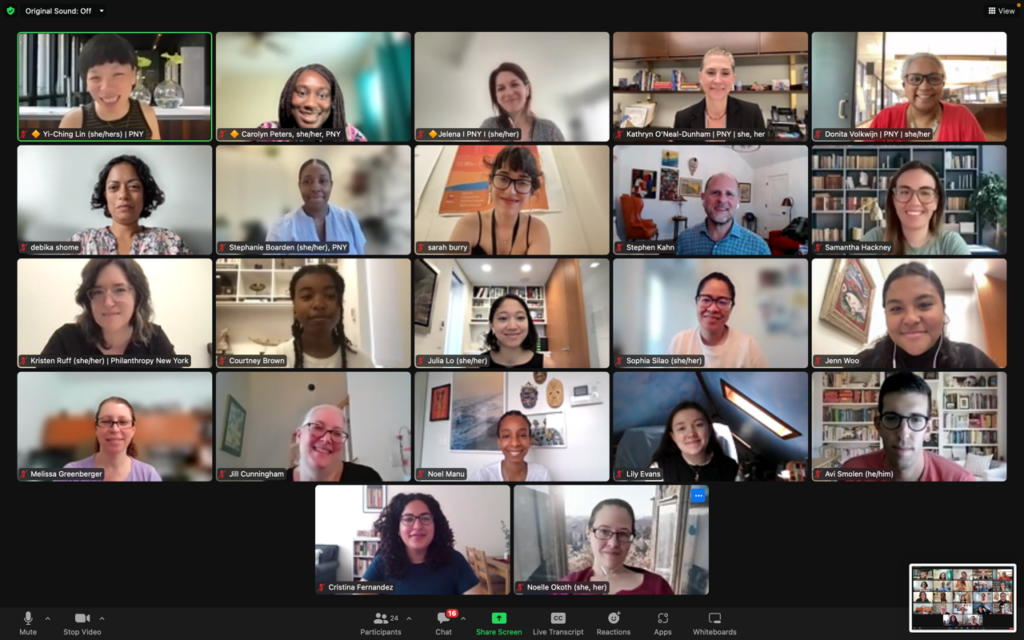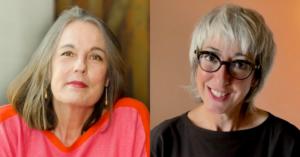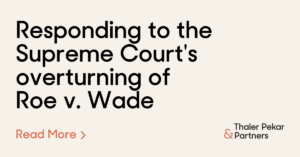4 min read
How to Listen in an Overstimulating World

By Lily Evans | levans@thalerpekar.com
Are you hearing the people in your life — truly?
Hi! I’m Lily, Thaler Pekar & Partners’ intern for the summer! I’m super excited to get the opportunity to learn and work with the team. I’m currently an undergraduate student at the University of British Columbia in Vancouver, BC, studying International Relations and German Studies. I’m also a huge film nerd, something I hope to be able to share with you all in future blog posts!
How does one listen? It’s a deceptively simple question.
Sure, “with your ears” is a good start at an answer, but to define what truly listening is, now that’s a bit harder. Most kids grow up being told to listen — listen to your teacher, your parents — and many adults have (or have wanted to) exclaim “you’re not listening to me!” in a particularly frustrating situation.
If there’s one thing we could all benefit from, it’s good communication skills. So, getting an internship where you have the chance to sit in on a workshop and learn how to better communicate with people in your life sounds a little too good to be true. Yet, on June 23, there I was, waiting for the right moment to click the “join meeting” button on Zoom. Graciously, I had been invited by Thaler Pekar and Philanthropy New York to sit in on their workshop, “Beyond Listening: Ensuring Others are Heard.”
After a short introduction by Yi-Ching, Vice President of Learning at Philanthropy New York, Thaler takes the time to introduce herself and describe herself and her surroundings, carefully highlighting her silvery short hair as well as the colorful books and white peonies that dot her Zoom backdrop to cultivate the gentle mood that filters through the rest of the workshop. “I want to teach you practical tools that you can use immediately in your work,” Thaler tells the group, launching into a brief history of the program and its goals. “How do we listen in this increasingly polarized society? How do we make virtual spaces intimate? Have we lost our ability to listen?” She asks, then adds, “What does recording mean?” I smile to myself as she questions our inclinations to record everything, asking if people are less willing to open up while being recorded. I’m writing sloppily on a piece of lined notebook paper, hoping my hand doesn’t begin cramping this soon into the event — it’s 90 minutes long after all — reflecting on my own obvious reliance on technology.
“How many minutes of high quality listening do you receive in a week? And how much do you give?”, Thaler asks the group. She handles her work with a gentle sincerity that disarms her attendees and opens everyone up to a more authentic experience. The session stays quiet at first, everyone clearly still a bit nervous. “I’m not listened to much because everything is virtual. It’s all done by email.” the first participant offers up. “But it’s fine, I guess,” like many of us do when something supposedly minor upsets us. The session then begins to blossom with a discussion about the difficulty of truly listening in an overstimulating world, where everyone is expected to multitask.
“The less you listen, the less you hear,” Thaler adds, leading into her next major point on the importance of suspending presumption and not listening for what we think we’re going to hear. She tells the group to think of communication as an exploration of someone else’s mind. I think about all the times I’ve finished my loved ones’ sentences in the past month alone as she explains that even though we may intend to be benevolent, that exact practice prevents the other person from expressing themselves authentically.
Thaler announces that we’ll be going into our first breakout room and anxiety begins to settle in my stomach. I’m not sure if I’ll be asked to participate. I stand out a bit, being the only professional-in-training in the virtual room, but into the breakout room I go. We’re all learning, I try to remind myself, and I’m quickly proven right because everyone I meet in the session is surprisingly welcoming. My first instinct is to feel badly for the person paired with the intern instead of a fellow philanthropist, but nobody I’m partnered with for the entirety of the session takes what I say with anything other than respectful interest and sincerity.
My initial assumptions are challenged further when we return to the main room and someone speaks up. “I had to let go of fear,” they offer, “I wondered if I would be judged.” Others nod in agreement. It’s helpful to realize that everyone is feeling, for the most part, very similar things. The chat is full of little tips, comments, and props given to those who speak up. Thaler then goes on to describe what gets in the way of our listening. Power, she explains, can shut down open communication and true listening. Without realizing it, I’ve been shutting myself off from open communication in this very event by regarding the other attendees as more authoritative than myself.
“There’s a fear of inadequacy in philanthropy,” one participant offers, explaining that not having the tools to help someone leads many people to not actively listen when a particularly difficult or emotional story is being shared. “Listening is powerful in and of itself,” Thaler replies, elaborating that admitting you don’t have the exact answer is a way of giving up your own power. She emphasizes the importance of recognizing that we all approach situations differently. All methods of problem solving come from somewhere, even if we may take them for granted because they’re so ingrained in our societal ways of thinking. Part of listening is recognizing that our way of approaching a situation, or of telling a story, is not the approach others may take. Rather than being a hindrance, this variety of perspectives, if treated with respect offers a chance for deeper understanding. Echoing the event’s title, Thaler admits that although we’ve been focusing on truly listening, what matters most is ensuring the other person is heard. In order to do that she offers tips including asking, “Do you think I understand you enough?” and “What do I need to know so you feel dignified or heard?”
Thaler’s 17 year old cat Johnny — who “gets whatever he wants” — jumps up on her lap as she quotes author George Saunders. “What questions are being raised for you? Are you finding certain approaches more helpful than others? Are there things you’re wondering about? Most of all: if something in your reading/writing life is causing you anxiety, ask about it. I’ve come to believe that one of the essential jobs of a teacher is to reduce the student’s anxiety.” Saunders had to say about the responsibility of a teacher, not all that dissimilar to the responsibility one carries in making others feel heard. The session concludes with small group discussions of what we’ve taken away from the workshop and what we have to add. “A certain sophistication is required to get funding. Who are we pushing out because they may not have the exact training?” one attendee asks in the breakout room I’ve been assigned to. “Who isn’t in the room that should be? We have to ask ourselves those questions,” another echos. I’m pleasantly surprised by the willingness of the professional attendees to ask these hard-hitting but necessary questions.
As participants begin to filter out and the session draws to a close, I’m surprised by how truly effective the workshop seems to have been. More than run of the mill advice, Thaler seems to have given everyone the ready-to-use tools she promised in the beginning of the call. I’m no executive, but regardless, I feel I’m walking away a better communicator. I think of a comment one participant mentioned after the second exercise, “I’ll admit at first I thought this was a little hokey. But by the time I finished the exercise, I felt I got to know my partner in a way I don’t think I’ve gotten to know anyone before.”
Thaler Pekar & Partners is internationally-recognized for its deep expertise in narrative, story, and communication. Both the BBC and the Smithsonian Institution have hailed the founder, Thaler Pekar, as one of the world’s leading experts on institutional storytelling.
For 14 years, the team at Thaler Pekar & Partners has advised visionaries on being understood and influential. Our trademarked communication processes — Heart, Head, & Hand®, Engagement Equation® and Invitational Incline® — provide leaders with the confidence to speak, listen, and be heard, and sustain them in offering effective motivation. As a result, teams are more productive, audiences are more receptive, and visibility increases.
Our award-winning work ranges from gathering 178 oral histories across four continents and six countries for Chuck Feeney’s The Atlantic Philanthropies; to finding and refining stories about integrity for Novartis senior leadership; to coaching a mainstage TED Talker; and to developing a communication and story skills academy for L’Oreál International Educators and Customer Representatives.







